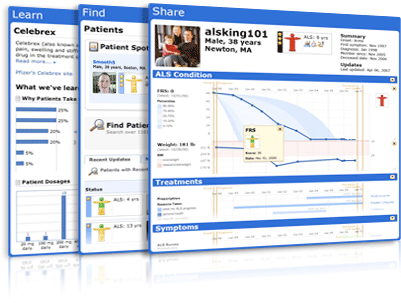Success of Health IT Depends on Cognitive Design
Monday, December 8th, 2008 As a cognitive designer using information technology (IT) to improve healthcare, I am always on the lookout for new applications that support or improve how clinicians, patients and family members think-and-feel.
As a cognitive designer using information technology (IT) to improve healthcare, I am always on the lookout for new applications that support or improve how clinicians, patients and family members think-and-feel.
One very interesting approach in the news is PatientsLikeMe. The site uses a social networking model to form online communities around specific conditions such as MS, Bipolar, Parkinson and HIV/AIDS. Members create detailed profiles of their history, condition and treatments that is freely shared with other members in the community. To make money the member’s data is packaged (with permission) and sold to insurance, medical device and pharmaceutical companies to support clinical trials and health studies.
Asking patients to participate in their electronic care so extensively, sharing health information so freely (PatientsLikeMe has an openess philosophy as well as privacy statement on their website) and then selling the data to “big brother” (insurance and drug companies) flies in the face of the traditional model that minimizes the role of the patient, locks health data in an electronic vault (privacy at all costs) and shuns selling it to vendors.
Patients help each other on a daily basis by providing information, advice, emotional support and even second opinions. The software provides each member a powerful visual history of their condition that clearly shows progress or decline.
The cognitive design of PatientsLikeMe is unique not only in the way it presents information but in the way it reshapes how patients think-and-feel about self care. It is a platform for creating patient practitioners with all the promise and risk that entails.
